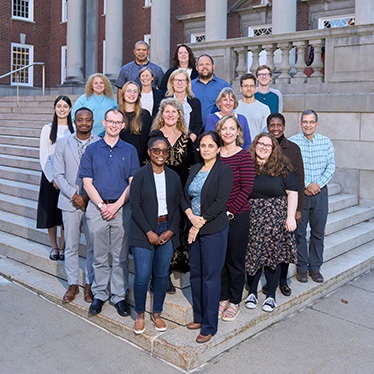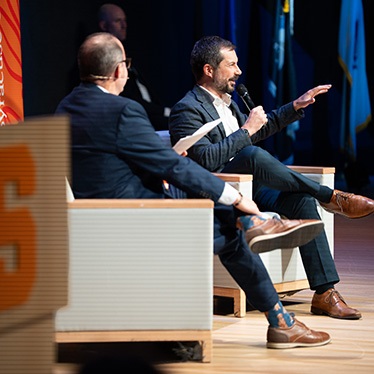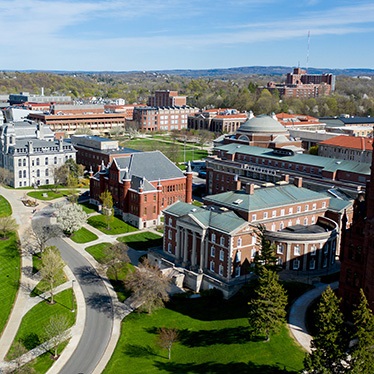From the Ground Up
February 14, 2018
Related:
Citizenship & Civic Engagement Undergraduate Program
Challenged to create a new undergraduate program that captures Maxwell’s distinctive strengths, a faculty committee selected, as the major’s focus, citizenship and civic engagement. The next question was: How do you teach those things?
Back in 2010, a Maxwell faculty committee led by political scientist Robert McClure convened in response to a challenge from SU Chancellor Nancy Cantor: consider creating a Maxwell School "signature major" — an undergraduate program that would build on what Maxwell does best and draw talented students. Members of the committee represented all the departments in Maxwell, from anthropology to economics to public affairs, and had no preconceived ideas about what a Maxwell signature major might be. The task of the committee was to explore the possibilities for a new major and, if they reached a consensus, draft a proposal.

Among the ideas discussed was creating an advanced-study certificate program or a specialized major, such as gerontology or urban studies, that drew on one area of expertise within the Maxwell faculty. "We batted a few of these around and thought, yes, we do that well. We do a lot of things well," recalls Paul Hagenloh, who represented the history department on the committee. "But that leaves out so many people."
Other ideas, such as a Maxwell honors program, were deemed to have too much overlap with existing programs. "Our goal was to offer something new to students," says Hagenloh, "to enhance but not overshadow other departmental majors."
Seeking a broad-based program that would involve all departments, the committee began to consider the possibility of a major that reflected Maxwell's signature mix of public affairs, the social sciences, and interdisciplinary teaching on citizenship — the defining feature of the School since its founding in 1924. "Maxwell is unique in that the social science departments and policy departments are located in the same school. That shapes what we do here both on the policy side and the social science side," says Hagenloh.
At the graduate level, students who want to take advantage of Maxwell's special structure — for instance, by pursuing a PhD in history and also doing work in international relations — can easily find their own path. But at the undergraduate level, such cross-over is more difficult because of the structure of departmental majors. So the committee resolved to create a program that would facilitate the blending of social science and public affairs and, in Hagenloh's words, "offer more of Maxwell to undergraduates."
The result is the signature major now known as the Maxwell Program in Citizenship and Civic Engagement. Undergraduates in the program major in one of the social sciences (or in a related discipline outside of Maxwell with a strong social science component) and also take a series of interdisciplinary courses, alongside students from many other fields, in which they apply the tools of their chosen discipline to address important public issues. This combination gives students a customized education that is rooted in one of the social sciences but also broadened by the insights of other disciplines, and that ultimately allows them to push beyond the boundaries of the classroom into real-world social action.
Students in the new program, says Hagenloh, "might have an interest in economics or sociology or history, for instance, and an interest in political engagement or social activism. Now they can pursue a degree that supports both. There are plenty of undergraduate public policy programs, and plenty of civic or political engagement programs, but no other programs that accomplish this dual task."
With Hagenloh as director, the new program will soon begin taking applications for its official launch in the fall of 2013. And with that, the citizenship and civic engagement major will offer a new way for undergraduates to tap into the School's oldest traditions.
Exploring Citizenship
As a unifying theme of the major, citizenship made great historical and pedagogical sense. "George Maxwell founded this school as a school of citizenship. That's what it says on the outside of the old building and even on the new one," says McClure, who joined the political science faculty in 1969 and has been deeply involved in citizenship education at Maxwell ever since. As the head of the committee developing the signature major, McClure felt his role was to make sure that the new program was consistent with the School's original mission to "both celebrate and illuminate the meaning of citizenship. That's what we do for undergraduates."
For nearly 90 years, the School has carried out this mission through citizenship courses in which students collectively wrestle with contemporary domestic and global issues and consider their obligations as citizens to address them. (See related story, page 14.) These courses are, by their nature, interdisciplinary — they create a space for dialogue among people from diverse backgrounds about the common problems they face.
“There are plenty of undergraduate public policy programs, and plenty of civic or political engagement programs, but no other programs that accomplish this dual task.”
Paul Hagenloh, Director, Citizenship and Civic Engagement
Since the '90s, the main avenue for citizenship education at Maxwell has been the MAX Courses, which are team-taught by scholars and practitioners in many fields. To the committee developing the signature major, the MAX Courses were an ideal foundation for the interdisciplinary side of the program.
"We collectively saw the value in these citizenship courses that already existed and decided to incorporate them in the major," says Kristi Andersen, who as Chapple Family Professor of Citizenship and Democracy oversees the MAX Courses. Students in the citizenship and civic engagement major will take at least one of the existing MAX Courses — Critical Issues in the United States, and Global Communities — and then proceed to three new MAX Courses that engage more deeply with issues of citizenship, ethics, and justice, as well as research methods.
In keeping with the structure of the whole program, the MAX Courses apply the tools of the social science disciplines to public issues that are inherently interdisciplinary. The faculty who teach these courses, says Andersen, are "still individually political scientists or economists or anthropologists, but the intended perspective of the students is as educated citizens, which is what George Maxwell wanted to produce. So we're using social science habits of looking carefully at facts and drawing conclusions in a systematic way to think about important issues, globally or domestically or both."
Taking Action
The committee developing the new major felt that many Maxwell faculty members and students share a desire to go beyond just thinking about important social issues. They want to apply their knowledge and take action in a way that few academic programs allow. One of the reasons students come to SU, says Hagenloh, is that they see the University as a "socially and politically engaged school where they can find pathways to make a difference." To the faculty committee, an undergraduate major in citizenship could clear a powerful new path to civic action for these kinds of students.
In the citizenship and civic engagement major, that path takes the form of an Action Plan, a capstone project in the student's senior year. The Action Plan is where the new program differs most strikingly from other undergraduate majors. In contrast to a traditional academic research paper, the Action Plan seeks to "get something of importance done, not just explain something worth thinking about," as the committee's final proposal puts it.
"The Maxwell major is about exploring what it means to be a citizen and then taking action as a citizen," says Bill Coplin, director of the undergraduate Public Affairs program and one of the core faculty for the new citizenship major. The Action Plan, he says, "could range from writing a grant for an agency to proposing policy to a senator to starting your own nonprofit organization."
Peter Wilcoxen, a professor of economics and public administration and international affairs who will be one of the advisors for Action Plans, offers an example from his field of climate change. "In economics, somebody might write an honors thesis analyzing a tradeable permit program at the national or international level," he says. By contrast, in an Action Plan, students "will not be coming up with abstract analyses of potential policies. They're going to write a plan that an individual or a group of people could actually implement."
Though the Action Plan aims for real-world impact, the committee wanted to make sure that it would be based on thorough research and rigorous analysis — not simply well-intentioned activism. In this aspect of the program, too, the student's chosen social science major is the key. "The idea is to ground the intervention, whatever the student's project is, in the social sciences," says economist Mary Lovely, director of the undergraduate International Relations program. "So I think that's very distinctive, it's very Maxwellian, and it brings to fruition the promise that this place has for undergraduate education."
Engaging Students
Roll-out of the Citizenship and Civic Engagement program officially begins this spring. Students will apply to enter the program either as sophomores (starting in the fall of 2013) or as freshmen (starting in 2014). The rationale behind the sophomore-year entry point is to make the program accessible to those who discover an interest in the topic after arriving at SU. Plans call for 15 freshmen and 15 sophomores to enroll each year, so by the time the program is in full swing 120 undergraduates will be majoring in citizenship and civic engagement — making this one of Maxwell's larger majors, and a significant presence within the School.
Only when the first classes are enrolled will the precise nature of the program be known. The major is designed to allow students to define for themselves the nature of their civic engagement. The Action Plans, in particular, will derive from students' interests.
"We don't want to press our interests in citizenship upon the students," says Amy Lutz, a sociologist who, along with Paul Hagenloh, will be teaching the new MAX Course on research methods and civic engagement. "We want them to develop it themselves. We're there as mentors. So it shouldn't be that we give them the Action Plan and they fill it in. It should be initiated by the student's desire to engage with a particular social problem."
Lutz and her colleagues foresee no difficulties in finding students who are self-directed in this way. "Maybe because I've been teaching MAX 123 [Critical Issues for the United States], I'm amazed at some of the students in their first and second year who have done a lot of volunteer work in particular," says Lutz. "They are starting nonprofit organizations and doing things that I never considered when I was a college student."
Hagenloh, who has been teaching the Global Communities MAX Course, is equally struck by the students' diversity and breadth of experience. "They bring a tremendous amount to the table, in terms of what they already know about the world," he says. Many of them, he adds, are already deeply engaged in civic activism in the varied countries from which they hail.
As he anticipates some of these MAX students becoming citizenship and civic engagement majors, he sees the great potential in how they will help shape the program. "This will be a joint project of the faculty and the students as we move forward, which is exciting because our students have a lot to offer intellectually to the institution."
By Jeffrey Pepper Rodgers
This article appeared in the fall 2012 print edition of Maxwell Perspective; © 2012 Maxwell School of Syracuse University. To request a copy, email maxwellperspective@syr.edu.
Related:
• From the Ground Up
• Legacy & Change
• Public Affairs and CCE
• The Tanner Lectures
• Robert McClure
• Kristi Andersen
Related News
School News

Dec 5, 2025
School News

Oct 23, 2025
School News

Oct 14, 2025
School News

Aug 25, 2025